The European Political Community: Establishment, Motivation and Prospect
Cui Hongwei



The European Political Community (EPC) is a forum-like institution established by the European countries out of their geopolitical needs and to overcome the dilemma of EU enlargement after the outbreak of Ukraine crisis. It has held three summit meetings so far in Prague on 6 October 2022, Burboac on 1 June 2023 and Granada on 5 October 2023 respectively. As defined by the European Council, it is a coordination platform of great symbolic importance that shall not replace any existing organization, structure or process, nor intends to create new ones at this stage. It aims to make up for the lack of appropriate institutional framework for political coordination in Europe under the Ukraine crisis. At the same time, it shuns away from the rigid institutional approach to deal with security challenges, and offers a new way to take EU out of its enlargement dilemma. Based on effectiveness and sustainability, it cannot avoid the key issues of power resources and leadership during its development, and more importantly, it will forge close relations with the future European security architecture in order to meet the common security challenges of Europe.
Establishment
After the outbreak of the Ukraine crisis on 24 February 2022, the EU accelerated its pace of enlargement, not only restarting the accession negotiations of the Western Balkan countries, but also granting Ukraine, Moldova and Georgia the status of candidate countries for accession. In view of the security challenges posed by the Ukraine crisis, most member states agree on the need for EU enlargement, yet there is wide disagreement on the timetable for enlargement as it involves important fiscal transfers and institutional reforms of the EU.
In his address to the closing ceremony of the Conference on the Future of Europe on 9 May 2022, Macron pointed out that the EU could not in the short term be the only way to structure the European continent, proposed to establish a “new political community” that would allow countries that subscribe to the “core values” to find “a new space for political cooperation” within its framework, so as to maintain the stability of the continent. Macrons proposal received strong support from European Council President Charles Michel. On 22 June 2022, the proposal for EPC was discussed during the EU Summit. The European Council stated that, the EPC was to be established to provide a platform for across continent political coordination, and to foster political dialogue and cooperation in order to address issues of common interest and promote the security, stability and prosperity of the European continent.
In October 2022, the first summit was held in Prague, bringing together heads of state from 44 countries including the EU and its 27 member states, the UK, Iceland, Norway, Switzerland, Liechtenstein from the European Free Trade Area, the Western Balkans of Serbia, Bosnia and Herzegovina, North Macedonia, Montenegro, Albania and Kosovo, and Eastern Partnership countries of Ukraine, Georgia, Moldova, Azerbaijan, Armenia and Türkiye. Leaders agreed to hold summit meetings twice a year, with the host rotating between EU and non-EU member states. At the Moldova Summit in June 2023, Monaco, San Marino and Andorra were added to its membership.
The EPC sets up an attractive mode for equal cooperation between sovereign states as it adopts flexible and informal intergovernmental exchanges, coordination and cooperation by holding round tables, bilateral and small multilateral meetings, without setting up corresponding permanent institutions and funds. The Ukraine crisis and energy crisis are at the heart of the leaders discussions, with other areas covered including digital facility (networks, undersea cables, data centers), infrastructure, gas pipelines, defense, migration, and regional disputes.
France is a staunch supporter of the EPC. In Frances view, the Community could become an integral part of the European political architecture, not only as a useful forum for dialogue, but also as a source of cooperation projects among its members. Close to the French position, Italy is keen to exploit the potential of the Community to promote concrete cooperation projects. Germany, Poland and the European Commission have expressed measured support for cooperation projects. Most EU member states do not want EU institutions to spend too much EU fund due to their participation in the Community, and EU candidate countries fear that the Community could become an alternative to EU enlargement.
Non-EU countries of Moldova, Türkiye and the UK have taken a positive stance towards the EPC. Moldova offered to host the second summit. Türkiye is looking to the Community as a new way to develop relations with European countries while bypassing EU institutions. For the UK, as the Euro-Atlantic region remains a priority in its international strategy and practical cooperation with the EU stays high on its foreign policy agenda, it will host the fourth Summit in the first half of 2024.
While still in its infancy, the EPC member states have already reached some bilateral and small multilateral agreements through the platform. To name a few, the UK and the North Seas Energy Cooperation whose organization membership includes eight EU member states and Norway have signed a MOU to deal with energy supply issues. The French and British leaders pledged to boost bilateral cooperation in energy, illegal immigration and defense. In the area of mediating regional disputes, Michel, Macron and Scholz met with the leaders of Azerbaijan and Armenia in an effort to forge consensus on Nagorno-Karabakh peace agreement. The leaders of Türkiye and Armenia held meetings to normalize bilateral relations. The issue of Kosovo was also high on its agenda.
Motivations
First, the EPC offers a new approach to solve the tough issues of EU enlargement under the new situation. In the context of the Ukraine crisis, the EU has accelerated its enlargement process, not only restarting the accession negotiations of the Western Balkan countries, but also granting candidate status to Ukraine, Moldova and Georgia, aiming to promote “geostrategic investment in a stable, strong and united Europe”. Enlargement not only involves budget, structural funds, common agricultural policy and other issues of interest, but also affects decision-making efficiency, making it a new impetus for the reform of EU institutions.
Second, it aims to fill the EUs geopolitical and geostrategic void and wipe off the continents security gray zone, which refers to the EU and Russias common neighborhood of Eastern Europe, the Western Balkans, the South Caucasus, the Black Sea and Eastern Mediterranean regions. As Russia sees these areas as geostrategic buffer zones and border zones of the “EU empire”, the EU needs a strategy to strengthen its influence in these areas, which explains why the EPC was materialized in a short period of time. In Macrons view, Britain must become a member of the Community. As the second largest economy in Europe and a powerful country in military strength, UKs Brexit has dealt a serious blow to the EUs geopolitical influence. Türkiye is of strategic importance to European security in the Middle East, Eastern Mediterranean and Black Sea regions. As the EU is decoupled from its largest energy supplier of Russia, it faces a huge challenge of energy supply substitution. Countries such as Norway, Azerbaijan and Georgia are important sources of oil and gas for the EU, and Türkiye plays an important role in terms of infrastructure such as oil and gas corridors and gas terminals.
Last but not least, Europe is in urgent pursuit of strategic autonomy in the face of its increasing dependence on American decisions and capabilities when dealing with its own affairs. The Ukraine crisis has dealt a heavy blow to the goal of strategic independence of Europe, and Europe strategically relies more on the US. Macron warned that “Europe should not be a vassal of the United States”. The European strategic community generally believes that only by offering solutions to end conflicts in its neighborhood, and by making effective strategic responses to the challenges in its neighborhood can the EU have global weight and credibility. The EUs lack of strategic autonomy is highlighted by its lack of defense autonomy. From the perspective of A Strategic Compass for Security and Defense released by the EU in 2022, its strategic autonomy is obviously diluted, and most of the increased military expenditure of European countries may still flow to the US rather than to their own military industry.
Although the Ukraine crisis is far from over and the US has increased its military presence in eastern Europe, Europe has a relatively diminished role in US global strategy. America itself is divided over the Ukraine crisis, the role of its European allies, climate, energy and other issues. Fearful of increased burden of European security guarantees, the US expects Europe to increase its own military and security commitment to Ukraine.
Prospect
Will the EPC serve only as an expedient solution to the Ukraine crisis? Or, will it develop into a useful political and security organization that unite European countries? It depends largely on the political will of the European leaders. So far, its structure, function, orientation and relations with the future European security architecture are yet to be clear and need to be further observed.
First, the structure and leadership capability. In view of the different priorities and expectations of member states, the EPC maintains a vague strategic direction and runs as an informal body in order to guarantee its practicality. But the informal and non-centralized model makes it hard to be effective. Leadership is a question must be answered for the organization with 47 member states to provide solutions to problems. In this regard, the European academic community has two basic ideas: one is to form a structure with France, Germany, the EU and the UK as the core, which is the only way to formulate a clear list of strategies and in line with the resource capacities of European countries. Another is to establish a structure dominated by the Weimar triangle of France, Germany and Poland, the consideration of which is based on its institutional maturity, as well as the need to bridge the rift between East and West Europe over the Ukraine and migration crises.
Second, its relations with the future European security architecture. The Ukraine crisis has paralyzed the OSCE. The NATO cannot cover the whole of Europe in short term. Europe needs a new security framework to meet common challenges. It is in conformity with the birth of the EPC. It is not clear, however, whether it will form the foundation of a new security architecture for the continent. A German foreign policy think tank has proposed to set up Joint European Defense Initiative as the new European pillar of NATO. According to the initiative, NATOs major European allies such as Britain, France, Germany and Poland will use their advantage to protect Ukraine and Eastern European countries, and take more responsibility for future European security.
Whether it is the EPC or the above Initiative that will become the future European security architecture, the core is the EU-Russia relations. Yet, France and Germany are at odds with each other on this issue. At the Munich Security Conference in February 2023, Macron said that “to crush Russia has never been Frances position and it will never be”. For Germany, it agreed with France that Russia was an essential player in the future European security order before the Ukraine crisis, but it changed its position drastically after the crisis broke out. On 14 June 2023, the German government issued National Security Strategy stating that Russia is the most grave threat to peace and security in the Euro-Atlantic region in the foreseeable future and German foreign and security policy will adjust to the threat accordingly.
Third, the France-Germany relations within the EPC. The relations between France and Germany will be the key to the EPC no matter what shape its future structure takes. France is the largest military country in the EU, with a complete and advanced system and production capacity of military industry, as well as the ability to manufacture nuclear-powered aircraft carriers, but Frances economic strength is not enough to support European security needs, and its ambitions must be supported by Germany. In the new security environment, France-Germany competition for European leadership is on the rise. Germany is likely to break through its hurdles as a “reluctant great power” and define itself as a stronger geopolitical and security actor, playing a leading role in EUs future policy on Russia and Eastern Europe. As a result, Frances status as a political and security power in the EU is bound to be challenged by Germanys pursuit of the role of a geopolitical leader.
Conclusion
The EPC provides a platform for dialogue and coordination between EU member states and non-EU neighbors. Its future development faces two interrelated questions: First, whether Europes pursuit of its geopolitical role will change the criteria for EU enlargement. Second, whether Europes new security environment has changed the way Europeans think about and pursuit of peace. Mark Leonard, Director of the European Council on Foreign Relations, argues that over the past half century, European countries have developed a concept of freedom based on universalism, rejection of military force, economic interdependence, shared sovereignty, and the establishment of Europe as a single entity based on a set of common institutions. And the EUs response to the Ukraine crisis could turn the project of peaceful European integration into a security project.
Cui Hongwei is Researcher at the Institute of International Studies, Shanghai Academy of Social Sciences
- 当代世界英文版的其它文章
- Historic Achievements of Institutional Construction of Intraparty Rules and Regulations of the Communist Party of China in the New Era
- Global Economic and Trade Landscape Reshaping and High-Quality Belt and Road Cooperation
- National Security Dilemma in the Digital Era and the Building of a Community with a Shared Future in Cyberspace
- The New Situation of Africa’s Autonomous Development: Causes and Prospects
- China’s Development in the New Era to Make Greater Contributions to the World
- Towards a Community with a Shared Future for Mankind: Theoretical Basis and Practical Logic of Jointly Advancing the Belt and Road Initiative

